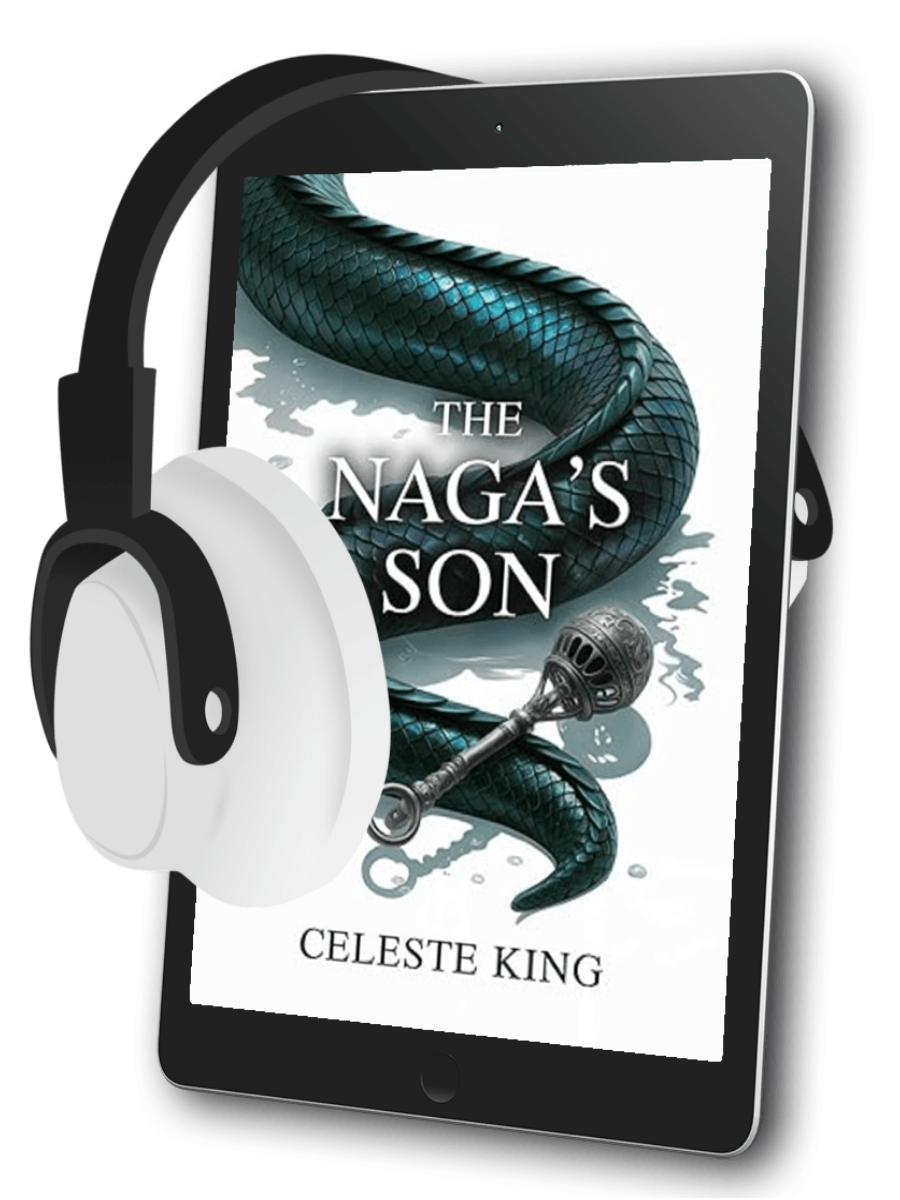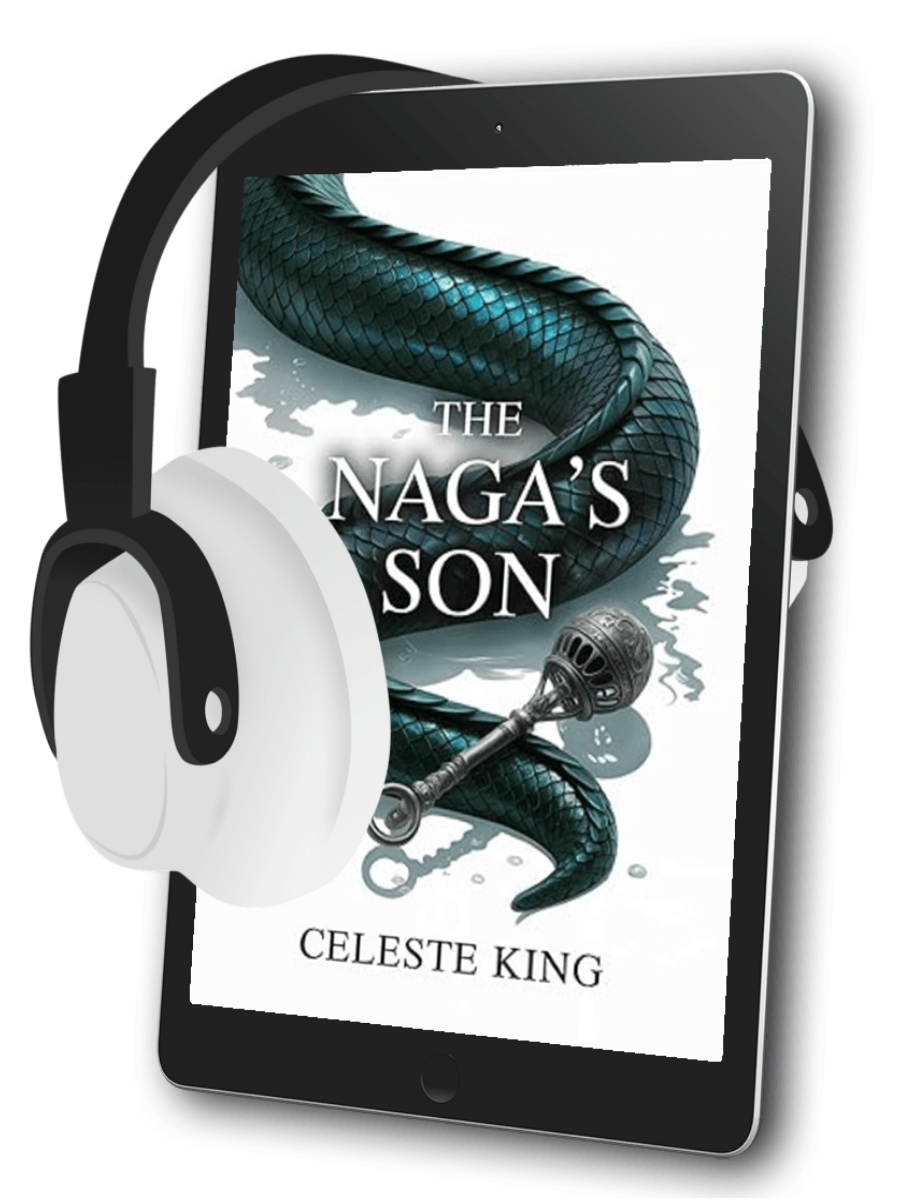Celeste King
The Naga's Son
The Naga's Son
Couldn't load pickup availability
- Buy ebook
- Receive download link via email
- Send to preferred e-reader and enjoy!
Get the full, unabridged verison with all the spice. Only available here!
She was supposed to drown.
I made sure of it.
But the sea didn’t keep her. It remade her.
Now she’s rising from the depths with salt on her skin and vengeance in her eyes—and the son I never knew I had in her arms.
The boy’s mine.
The woman holding him is my punishment.
Every word from her mouth drips with hatred, every glance burns with the same fire that once made her tremble beneath me.
She thinks I’m still the monster who threw her to the waves.
She’s wrong.
The real monster is the one I’ve become trying to earn her forgiveness — because I’ll burn the world before I let her vanish into the sea again.
She came back to destroy me.
She doesn’t know I’ve learned to love what I damned.
And she can swear to haunt me forever.
I welcome it.
Becuase I’m obsessed.
Read on for enemies to lovers, forced proximity, single dad obsession, and a sea-witch who makes her monster kneel. HEA Guaranteed!
Chapter 1 Look Inside
Chapter 1 Look Inside
Chapter 1
Selira
The hold reeks of brine and despair. I press my back against the salt-crusted wood, feeling the ship's hull groan beneath the weight of winter waves. The rope burns on my wrists have scabbed over, but they still throb with each roll of the vessel.
I've lost how long it's been since the naga swept through our village like a plague. If I were to guess, it's been two weeks. But it's impossible to tell time down here.
I close my eyes and let the memory wash over me, sharp as broken glass.
The morning had started with preparation for the Ember Festival. Our entire village buzzed with anticipation—children stringing dried berries and pine boughs while their mothers ground spices for the feast bread. The scent of cinnamon and nutmeg filled every home, mixing with woodsmoke from the great bonfires being built in the village square.
I'd been helping Marta, the baker's wife, carry sacks of grain from the storehouse when the screaming started.
"Naga!" someone shrieked from the harbor. "Ships on the horizon!"
The grain spilled from my hands, scattering across the frozen ground like scattered hope. I ran toward the docks, my boots sliding on patches of ice, heart hammering against my ribs. Three sleek vessels cut through the gray waters, their serpentine figureheads gleaming wet and predatory.
"Get the children inside!" Mayor Aldric bellowed, but it was too late. The naga moved faster than sea serpents, their scaled tails propelling them onto our docks with fluid grace that made my stomach turn.
They didn't want our grain or our gold. They wanted us.
I watched them drag screaming women from their homes, binding their wrists with enchanted rope that glowed faintly blue. When I tried to run, one of them caught me—a massive male with emerald scales and eyes like winter storms. His claws bit into my arms as he hauled me toward the ships.
"Perfect," he'd hissed, his forked tongue flicking out to taste my fear. "This one has fire in her."
Behind me, the village burned. Not from dragon fire or siege engines, but from the overturned braziers meant for our festival. The Ember Festival—our celebration of community, of surviving another year together, of making sure no family went cold or hungry through the harsh months.
All of it reduced to ash and screaming.
My hands curl into fists. The rage burns hotter than any festival fire, consuming the hollow ache in my chest where homesickness tries to take root. I won't let it. Won't let myself think about what's happening back home—if there even is a home left to return to.
But the thoughts come anyway, unbidden and cruel.
Right now, if the village still stands, they'd be lighting the Grand Ember. One massive bonfire in the center of the square, built from wood donated by every family. Children would dance around it while their grandparents told stories of winters past. The smell of roasted root vegetables and honey cakes would fill the air, along with the sound of fiddles and drums.
Each family would bring what they could to the communal feast—those with plenty sharing generously, those with little contributing what they're able. Old Henrik always brought his famous apple wine. The Morrison family made the best meat pies in three counties. My own mother used to spend weeks preparing her spiced fruit preserves, ladling them into small jars tied with ribbons for neighbors and friends.
No one went hungry during the Ember Festival. No one went cold. That was the point—to strengthen the bonds that would carry everyone through winter's darkest months. To remind ourselves that we were more than just individuals struggling to survive. We were a community.
Were. Past tense now, assuming any of them survived the raid.
The ship lurches violently to one side, and I brace myself against the wall, teeth gritted against the nausea that rolls through my stomach. The naga who captured us seem immune to seasickness, their serpentine forms perfectly adapted to this environment. They move through their ship like they were born on the waves.
Which they probably were.
But now I'm alone down here, fighting the sea sickness and waves through my own. Everyone else has been taken one by one.
The first to disappear was Elena.
I remember the sound of the hatch opening above us, the way pale winter light spilled down like a blade cutting through our darkness. Heavy footsteps on the ladder, then the scrape of claws against wood. Elena had been pressed against the far corner, still clutching the torn remnants of her wedding veil.
"You." The naga's voice carried the authority of someone used to being obeyed without question. "Come."
Elena shook her head, tears streaming down her dirt-stained cheeks. "Please, I just got married yesterday. My husband—"
"Your husband is likely dead." The creature's tone held no malice, just cold fact. "Come willingly, or I'll drag you."
She went willingly in the end. They always do. The enchanted rope around our wrists burns like fire if we struggle too hard, and the naga know it. Elena cast one desperate look back at us before the hatch slammed shut, sealing us in darkness again.
We waited for her to return. Hours passed, marked only by the rhythm of waves against the hull and the gradual shift of light filtering through the cracks above. When the sun set and she still hadn't come back, Sarah started crying again.
"Maybe they just moved her to a different part of the ship," whispered Marta, though her voice shook with doubt.
But I knew better. The village stories were filled with warnings about naga ships and what happened to the women they took. Some tales spoke of slave markets. Others mentioned darker purposes—nobles who kept human pets for entertainment, or worse.
The second to go was young Lily, barely old enough to be called a woman. She fought harder than Elena had, screaming and thrashing as they hauled her up the ladder. The sound of her terror echoed through the hold long after the hatch closed. When she didn't return by the next morning, the rest of us stopped pretending there was hope.
By the fourth disappearance, we'd learned to stay silent when they came. No pleading, no promises of ransom money that none of us possessed anyway. Just numb acceptance as another woman vanished into whatever fate awaited above deck.
I press my palm against the hull, feeling the bone-deep cold seep through the wood. Ice has begun forming along the edges of the hold where our breath meets the frigid air. My fingers are numb despite the thin blanket they gave us—more mercy than I expected, though it does little against the biting chill. The winter ocean shows no kindness to prisoners.
Above me, shadows move across the deck. I can hear them through the thin planking—the scrape of scales against wood, the low murmur of voices speaking in their serpentine language. Each footstep sends anxiety crawling up my spine like spiders. Any moment, that hatch could open again. Any moment, they could come for me.
The waiting is its own special torture. Not knowing when, not knowing what they want us for. Sarah kept insisting they're taking us to be sold, that we'll end up as servants in some noble house. It was the hope she clung to, the story she tells herself to keep from breaking completely. I wonder if she's still thinking that now, when I haven't seen her in two days.
But I've seen the way the crew looks at whoever is left when they bring our meager rations. Not like merchants evaluating merchandise. Like predators sizing up prey. There's something hungry in their eyes that has nothing to do with gold or trade agreements.
The worst part is the cold. It seeps into everything—my bones, my thoughts, my dwindling hope. The blankets, which I now have all to myself, thin and damp, offering little protection against the winter air that finds every crack in the ship's hull. My breath fogs in small puffs that disappear almost instantly, and my lips have cracked from the salt air.
But even through the physical discomfort, it's the shadows that terrify me most. Every time one passes overhead, my heart hammers against my ribs. Is this it? Is this when they come for me?
The dread sits in my stomach like a stone, heavy and cold. It mingles with the seasickness and hunger until I can't tell one misery from another. Time moves differently down here, marked only by the twice-daily delivery of stale bread and brackish water. Sometimes I think I hear screaming from other parts of the ship, but it might just be the wind through the rigging. Or my imagination, feeding on the fear that grows stronger with each passing hour.
I close my eyes and try to summon the rage that sustained me through those first days. The fury at everything stolen from me—my freedom, my home, my future. But even that feels muted now, smothered under layers of exhaustion and cold.
A new shadow passes overhead, slower this time. Deliberate. My muscles tense involuntarily as footsteps pause directly above us. I know that I'm on borrowed time, but there's nothing I can do about it.
The footsteps move on, but the fear remains. We all know it's only a matter of time. One by one, they'll come for each of us until this hold stands empty except for the ghosts of our terror.
I pull my knees closer to my chest, trying to conserve what little warmth my body still produces. The rope burns on my wrists throb in rhythm with my pulse, a constant reminder that I'm trapped here. That I'm helpless.
Share


